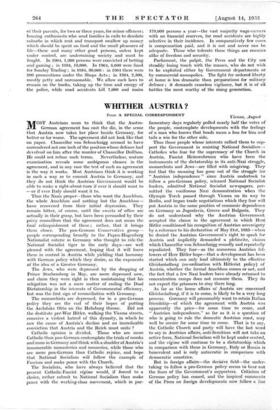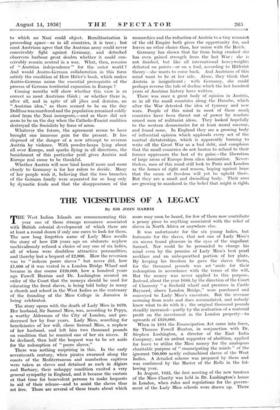WHITHER AUSTRIA ?
From A SPECIAL CORRESPONDENT
Vienna, August Thus the Nazis proper—those who want the Anschluss, the whole Anschluss and nothing but the Anschluss- have recovered from their initial depression. They remain bitter, of course, until the sweets of office are actually in their grasp, but have been persuaded by their privy councillors that the agreement does not mean the final relinquishment of these ; rather, that it brings them closer. The pan-German Conservative group— people corresponding broadly to the Papen-Hugenberg Nationalist coterie in Germany who thought to ride the National Socialist tiger in the early days—are well pleased with the agreement, hoping that it will leave them in control in Austria while yielding that harmony with German policy which they desire, as the exponents of the idea of a Greater Germany.
The Jews, who were depressed by the dropping of Prince Starhemberg in May, are more depressed now, and claim they were right in then maintaining that his relegation was not a mere matter of ending the Dual Dictatorship in the interests of Governmental efficiency, but was the first sign of reconciliation with Germany.
The monarchists are depressed, for in a pro-German policy they see the end of their hopes of putting the Archduke Otto on the Habsburg throne. Did not the destitute pre-War Hitler, walking the Vienna streets, conceive a violent hatred of this dynasty, in which he saw the cause of Austria's decline and an ineradicable conviction that Austria and the Reich must unite ?
Catholic opinion is divided. Those who are more Catholic than pan-German contemplate the trials of monks and nuns in Germany and think with a shudder of Austria's innumerable monasteries and nunneries, while those who are more pan-German than Catholic rejoice, and hope that National Socialism will follow the example of Fascism and make peace with the Church.
The Socialists, who have always believed that the present Catholic-Fascist regime would, if forced to a choice, rather submit to National Socialism than make peace with the working-class movement, which in par- liamentary days regularly polled nearly half the votes of the people, contemplate developments with the feelings of a man who knows that heads mean a loss for him and tails a win for the other side.
Thus those people whose interests rallied them to sup- port the Government in resisting National Socialism— Catholics who fear for the supremacy of the Church in Austria, Fascist Heimwehrmen who have been the instruments of the dictatorship in its anti-Nazi struggle, monarchists and Jews—are filled with misgiving. They feel that the meaning has gone out of the struggle for " Austrian independence " since Austria undertook to follow a pro-German policy, released National Socialist leaders, admitted National Socialist newspapers, per- mitted the vociferous Nazi demonstration when the Olympic Torch passed through Vienna on its way to Berlin, and began trade negotiations which they fear will put Austria in the same position of economic dependence on Germany as Jugoslavia, Greece and Bulgaria. They do not understand why the Austrian Government, accepted the clause in the agreement in which Herr; Hitler conditioned his recognition of Austrian sovereignty by a reference to his declaration of May 21st, 1935—when he denied the Austrian Government's right to speak for Austria and implicitly demanded a plebiscite, claims. which Chancellor von Schuschnigg roundly and repeatedly repudiated. They fear—as the numerous Austrian fol-. lowers of Herr Hitler hope—that a development has been started which can only lead ultimately to the effective Gleichselialtung (co-ordination with Hitlerist policy), of Austria, whether the formal Anschluss comes or not, and the fact that a few Nazi leaders have already returned to concentration camps does not reassure them. They do not expect the prisoners to stay there long.
As far as the home affairs of Austria are concerned Gleichschallung, if it is to come, is likely to be a very long process. Germany will presumably want to retain Italian friendship—of which the agreement with Austria was apparently the price—for some time to come, and " Austrian independence," as far as it is a question of who is going to rule the domestic Austrian roast, may well be secure for some time to come. That is to say, the Catholic Church and party will have the last word to say in Austrian affairs, anti-Semitism will not take an active form, National Socialism will be kept under control, and the regime will continue to be a dictatorship which in comparison with those in Germany, Italy or Russia is benevolent and is only autocratic in comparison with democratic countries.
But in foreign affairs—the decisive field—the under- taking to follow a pro-German policy seems to. bear out the fears of the Government's supporters. Criticism of German policy has ceased, and the inspired comments of the Press on foreign developments now follow a line to which no Nazi could object. Remilitarisation is proceeding apace—as in all countries, it is true ; but most Austrians agree that the Austrian army could never conceivably fight against Germany, and detached observers harbour great doubts whether it could con- ceivably remain neutral in a war. What, then, remains of " Austrian independence " for the outer world ? And would Austro-German collaboration in this form satisfy the condition of Herr Hitler's•book, which makes Austro-German union the essential prerequisite of the process of German territorial expansion in Europe ?
Coming months will show whether this view is as correct as most Austrians think ; or whether there is, after all, and in spite of all jibes and derision, an " Austrian idea," as there seemed to be on the day Dollfuss was murdered and the population remained coldly aloof from the Nazi insurgents,—and as there did not seem to be on the day when the Catholic-Fascist coalition destroyed the Socialists by force of arms.
Whatever the future, the agreement seems to have brought one immense gain for the present. It has disposed of the danger of a new attempt to overrun AUstria by violence. With powder-heaps lying about all over Europe, and sparks flying in all directions, the banishment of this particular peril gives Austria and Europe real cause to be thankful.
Whether Austria will now bind herself more and more closely to Germany is for her rulers to decide. Many of her people wish it, believing that the two branches of the German family were separated for so long only by dynastic feuds and that the disappearance of the monarchies and the reduction of Austria to a tiny remnant of the old Empire both gives the opportunity for, and leaves no other choice than, her union with the Reich.
Germany has shown that far from being crushed she has even gained strength from the last War ; she is not finished, but like all international heavyweights defeated on points—or on a foul, according to Hitlerist theory—she wants to come back. And Austrians of this mind want to be at her side. Alone, they think that Austria is ' insignificant ; with Germany, she could perhaps reverse the tale of decline which the last hundred years of Austrian history have written.
There was once a great body of opinion in Austria, as in all the small countries along the Danube, which after the War detested the idea of tyranny and new wars. People of this mind in most of these small countries have been thrust out of power by resolute armed men of militarist ideas. They looked hopefully to the western democracies for at least moral succour, and found none. In England they see a growing body of influential opinion which applauds every act of the martial dictatorships, which is apparently burning to write off the Great War as a bad debt, and complains that the small countries do not hasten to refund to their former oppressors the last of its gains—the liberation of large areas of Europe from alien domination. Never- theless, men of this mind still look to Paris and London as the homes of right and reason, hoping against hope that the cause of freedom will yet be upheld there. But they are a small and dwindling body. Their sons are growing to manhood in the belief that might is right.







































 Previous page
Previous page